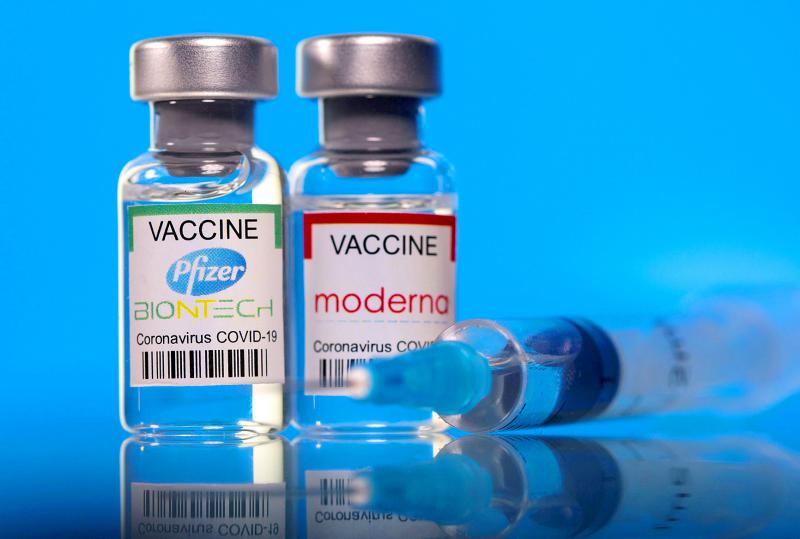Minister of Health and Welfare Chen Shih-chung (陳時中) yesterday said that he had asked his US counterpart for assistance obtaining COVID-19 vaccines.
Chen’s video conference with US Secretary of Health and Human Services Xavier Becerra lasted about 30 minutes yesterday morning, the Ministry of Health and Welfare said in a news release.
Later yesterday at the Central Epidemic Command Center’s (CECC) daily news conference, Chen said that he told Becerra about Taiwan’s urgent need to acquire more vaccine doses amid a COVID-19 outbreak since last week.

Photo: Reuters
Chen, who heads the CECC, expressed his hope that the US would support Taiwan as it is to share vaccine doses with the rest of the world.
In response to media queries on whether Becerra promised that the US would supply doses to Taiwan, Chen said that Becerra reiterated Washington’s support for its allies.
Becerra said he would report on the meeting to US President Joe Biden and the US would consider Taiwan’s need when distributing the vaccines, Chen said.
Taiwan’s battle against COVID-19 has been complicated by a limited supply of vaccines. As of yesterday, about 700,000 doses had arrived, including 410,000 of AstraZeneca PlC’s COVID-19 vaccine earlier this week.
The ministry last month said it expected deliveries of 5.05 million doses of the Moderna Inc COVID-19 vaccine this month.
However, the delivery schedule remains uncertain, with the ministry on Wednesday saying that it had so far received 200 trial doses.
After the video conference with Chen, the US Department of Health and Human Services wrote on Twitter that the US “supports Taiwan’s ability to access vaccines.”
“Great meeting with Minister Chen from Taiwan to discuss the ongoing pandemic & global health issues. The U.S. supports Taiwan’s ability to access vaccines, its contributions to health security, & its return to observership at the #WHA,” it said, referring to the World Health Assembly.
In other news, Minister Without Portfolio Audrey Tang (唐鳳) on Thursday hosted an online meeting on Taiwan’s contribution to open government and anti-corruption efforts.
The meeting was attended by Scott Busby, US acting deputy assistant secretary in the Bureau of Democracy, Human Rights and Labor at the Department of State, and non-governmental organization leaders including Open Government Partnership deputy director Shreya Basu and Transparency International senior program manager Conny Abel.
The panel discussed how technology can build freer and more open societies, with participants emphasizing the role of technology in supporting information transparency, deepening public-private collaboration and strengthening civil society, the US Department of State said in a news release on Thursday.
The panel also discussed how the COVID-19 pandemic affected transparency efforts, and how media can investigate and raise awareness of corruption, it added.
The event highlighted Taiwan’s contribution to the Global Anti-Corruption Consortium, which supports investigative journalism’s role in documenting corruption, it said.
Additional reporting by Reuters and CNA

CHAOS: Iranians took to the streets playing celebratory music after reports of Khamenei’s death on Saturday, while mourners also gathered in Tehran yesterday Iranian Supreme Leader Ayatollah Ali Khamenei was killed in a major attack on Iran launched by Israel and the US, throwing the future of the Islamic republic into doubt and raising the risk of regional instability. Iranian state television and the state-run IRNA news agency announced the 86-year-old’s death early yesterday. US President Donald Trump said it gave Iranians their “greatest chance” to “take back” their country. The announcements came after a joint US and Israeli aerial bombardment that targeted Iranian military and governmental sites. Trump said the “heavy and pinpoint bombing” would continue through the week or as long

TRUST: The KMT said it respected the US’ timing and considerations, and hoped it would continue to honor its commitments to helping Taiwan bolster its defenses and deterrence US President Donald Trump is delaying a multibillion-dollar arms sale to Taiwan to ensure his visit to Beijing is successful, a New York Times report said. The weapons sales package has stalled in the US Department of State, the report said, citing US officials it did not identify. The White House has told agencies not to push forward ahead of Trump’s meeting with Chinese President Xi Jinping (習近平), it said. The two last month held a phone call to discuss trade and geopolitical flashpoints ahead of the summit. Xi raised the Taiwan issue and urged the US to handle arms sales to

BIG SPENDERS: Foreign investors bought the most Taiwan equities since 2005, signaling confidence that an AI boom would continue to benefit chipmakers Taiwan Semiconductor Manufacturing Co’s (TSMC, 台積電) market capitalization swelled to US$2 trillion for the first time following a 4.25 percent rally in its American depositary receipts (ADR) overnight, putting the world’s biggest contract chipmaker sixth on the list of the world’s biggest companies by market capitalization, just behind Amazon.com Inc. The site CompaniesMarketcap.com ranked TSMC ahead of Saudi Aramco and Meta Platforms Inc. The Taiwanese company’s ADRs on Tuesday surged to US$385.75 on the New York Stock Exchange, as strong demand for artificial intelligence (AI) applications led to chip supply constraints and boost revenue growth to record-breaking levels. Each TSMC ADR represents

State-run CPC Corp, Taiwan (CPC, 台灣中油) yesterday said that it had confirmed on Saturday night with its liquefied natural gas (LNG) and crude oil suppliers that shipments are proceeding as scheduled and that domestic supplies remain unaffected. The CPC yesterday announced the gasoline and diesel prices will rise by NT$0.2 and NT$0.4 per liter, respectively, starting Monday, citing Middle East tensions and blizzards in the eastern United States. CPC also iterated it has been reducing the proportion of crude oil imports from the Middle East and diversifying its supply sources in the past few years in response to geopolitical risks, expanding